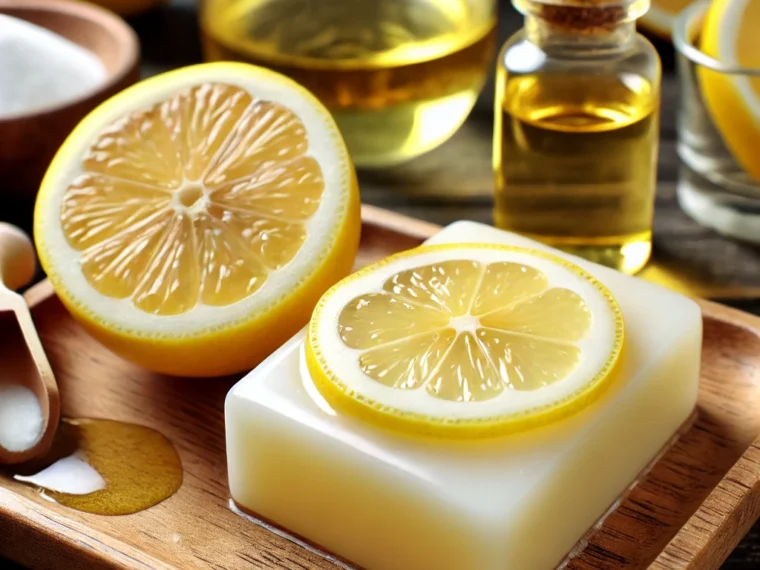Homemade soap-making is an enjoyable and rewarding craft, especially when it’s done with natural, easy-to-find ingredients. If you’re looking for an eco-friendly alternative to traditional soaps, which often include harsh chemicals like caustic soda (sodium hydroxide), this method of making soap with lemon, vinegar, and alcohol might be just what you need. Not only is it a safer option, but it also results in a wonderfully effective and refreshing soap, perfect for cleaning and sanitizing.
Why Choose a Soap Without Caustic Soda?
Traditional soap-making involves a process called saponification, where oils or fats are mixed with an alkali (usually caustic soda) to create soap. While this method works well, caustic soda can be dangerous to handle and isn’t always desired by those seeking natural or less harsh cleaning products. By using ingredients like lemon, vinegar, and alcohol, you can create a soap that is gentle on the skin, safe to use, and still provides excellent cleaning power without the risks associated with caustic soda.
Ingredients You’ll Need:
- Lemon juice: 1 cup
- White vinegar: 1 cup
- Rubbing alcohol (70% or 90%): 1/2 cup
- Glycerin: 1/4 cup (optional for moisturizing properties)
- Coconut oil: 1/4 cup
- Essential oils (lemon, lavender, or tea tree for added fragrance and benefits): 10-15 drops
- Natural soap base: 1 pound (choose a caustic soda-free base like glycerin soap or Castile soap)
- Water: 1/2 cup
Equipment:
- A double boiler or a microwave-safe bowl
- A soap mold (silicone molds work best)
- A whisk or spoon for mixing
- A measuring cup
- A spray bottle with rubbing alcohol (for spraying the top of the soap to remove bubbles)
Step-by-Step Instructions:
1. Prepare Your Soap Base
Choose a natural soap base that does not contain caustic soda, such as a pre-made glycerin or Castile soap base. You can find these in most health stores or online. Cut the soap base into small pieces and melt it using a double boiler or a microwave in 30-second intervals, stirring frequently until it’s fully liquefied.
2. Add Lemon Juice for Freshness and Cleaning Power
Lemon juice is known for its natural cleaning and disinfecting properties. It cuts through grease, brightens, and leaves a fresh scent. Add 1 cup of freshly squeezed lemon juice to the melted soap base. Stir well to ensure it mixes thoroughly with the soap base.
3. Add White Vinegar for Sanitization
White vinegar is another powerful natural cleaner, known for its ability to kill bacteria and break down dirt. Add 1 cup of vinegar to the mixture. This will help create a soap that not only cleans but also disinfects, making it ideal for hand soap or kitchen use.
4. Incorporate Rubbing Alcohol for Antibacterial Properties
To boost the soap’s germ-fighting abilities, add 1/2 cup of rubbing alcohol to the mix. Rubbing alcohol is an excellent sanitizer and will ensure that your soap is effective at killing germs and bacteria. It also helps the soap to set and harden faster.
5. Optional: Add Glycerin for Moisturization
Glycerin is a natural humectant, meaning it attracts moisture to the skin, keeping it hydrated. If you want a more moisturizing soap, add 1/4 cup of glycerin to the mixture. This is particularly useful if you have dry or sensitive skin.
6. Add Coconut Oil for Softness and Nourishment
Coconut oil is a wonderful ingredient to include in homemade soaps because of its moisturizing and skin-softening properties. Add 1/4 cup of coconut oil to the melted soap base, stirring well to incorporate it evenly. Coconut oil will also help the soap to lather better.
7. Add Essential Oils for Scent and Extra Benefits
For added fragrance and therapeutic benefits, add 10-15 drops of essential oils to your mixture. Lemon essential oil will enhance the fresh scent, lavender will add calming properties, and tea tree oil is known for its antibacterial and antifungal properties.
8. Mix Everything Together
Once all of the ingredients have been added, whisk the mixture well to ensure everything is fully incorporated. The mixture should be smooth and free from lumps. Be sure to work quickly before the soap base begins to harden.
9. Pour the Mixture into Soap Molds
Carefully pour the soap mixture into your chosen soap molds. Silicone molds work best because the soap is easy to remove once it has hardened. If you see any bubbles on the surface of the soap, spritz a little rubbing alcohol from a spray bottle to remove them.
10. Let the Soap Set
Allow the soap to set and harden at room temperature for several hours or overnight. Once the soap is firm to the touch, gently remove it from the molds.
Storing and Using Your Homemade Soap
Store your homemade soap in a cool, dry place, and avoid exposing it to excessive moisture to prolong its shelf life. This soap is excellent for daily use, providing a refreshing lemony scent and powerful cleaning action without the use of harsh chemicals.
Why This Soap Works
- Lemon juice: Known for its acidic properties, lemon juice helps to break down oils and grime, while leaving a fresh, natural scent.
- Vinegar: A natural antibacterial agent, vinegar helps kill germs and bacteria, making it ideal for a disinfecting soap.
- Rubbing alcohol: Alcohol boosts the soap’s germ-killing abilities and helps the soap harden more quickly.
- Coconut oil: Adds a nourishing, moisturizing quality to the soap, making it gentle on the skin.
- Essential oils: These provide added fragrance and therapeutic properties, depending on the type you choose.
Conclusion
Making homemade soap with lemon, vinegar, and alcohol is a simple, eco-friendly way to create a powerful cleaning product that is gentle on the skin. Without the need for caustic soda, this soap offers effective sanitizing properties, a refreshing scent, and moisturizing benefits, making it perfect for everyday use. Give this DIY soap recipe a try, and enjoy a natural, homemade alternative to store-bought soap!
